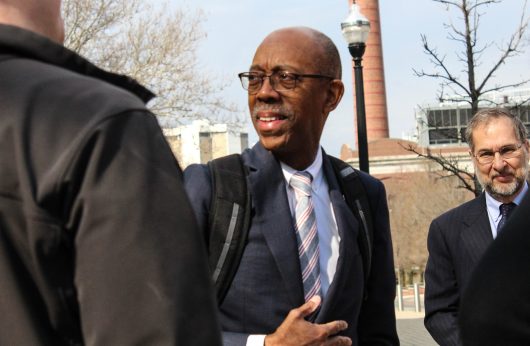Ohio State University President Michael Drake met with President Trump, CEOs of some of America’s most influential technology companies and higher-education leaders Monday in Washington as part of Drake’s invitation to have a role on the American Technology Council.
The council was organized by the White House’s Office of American Innovation and formed in May. It is made up of various members of Trump’s administration, including Vice President Mike Pence and Treasury Secretary Steve Mnuchin. Tech CEOs from Apple, Microsoft and Google’s parent company, Alphabet, along with 16 other U.S. technology companies as well as Drake, Carol L. Folt, the chancellor of University of North Carolina, and L. Rafael Reif, the president of Massachusetts Institute of Technology were also present for the Monday meeting.
Drake was chosen to be involved in the council because of his leadership at a land-grant, public-research institution, Chris Davey, an OSU spokesman, said.
“Our understanding is that the organizers wanted to have a very small number of universities represented and they wanted a mix (of the type of colleges represented),” Davey said.
UNC is a public college, OSU is a public, land-grant institution and MIT is a private research university.
Davey said Drake’s involvements in national higher-education organizations, and the recognition that comes from it, also contributed to why he was chosen to be involved with the council.

University President Michael Drake is working alongside some of the most well-known tech CEOs in the country in American Technology Council meetings. March 24. Credit: Alexa Mavrogianis | Former Photo Editor
“Dr. Drake is going to be the chair of the Association of Public and Land-grant Universities and will be chair of Association of American Universities, so he is recognized nationally as a leader in higher-education,” Davey said.
The American Technology Council is working to modernize the U.S. government as whole, as well as make the government’s computing systems more efficient, according to Reuters.
After the council met in various group sessions, they were spoken to by Trump on the importance of technological advancement in America.
“Our goal is to lead a sweeping transformation of the federal government’s technology that will deliver dramatically better services for citizens, stronger protection from cyberattacks — which we were just discussing in the Oval Office with a little bit smaller group,” Trump said during the roundtable meeting, according to the White House website. “That’s a big problem, there’s no question about it. We’re going to be working on it and we’re going to solve the problem.”
Trump said the government needs to catch up with the “technology revolution” for America to become a global leader in government technology.

Then President-elect, Donald Trump addresses the media at The Schottenstein Center on Dec. 8. Credit: Nick Roll | Former Campus Editor
Once the U.S. “catches up,” the technological advancements made will result in over $1 trillion in savings for taxpayers over the next 10 years, Trump said.
Davey said Drake detailed that a discussion he had with CEOs present revolved around the customer experience, and how it could be translated from businesses to government — specifically making the experience of signing up for Social Security benefits similar to that of an Amazon customer.
“They said if the experience that a customer on Amazon.com was similar to the experience of signing up for federal Social Security benefits that Amazon might not be in business,” Davey said.
A conversation on higher-education’s need for support via the federal government also took place, Davey said.
“Dr. Drake and his colleagues in higher-education were able to talk about the importance of federal support for research,” Davey said. “He talked about how important it is that while we work to innovate with programs like this, we also need to continue to support the innovation that’s already underway at the nation’s research institutions.”
Monday’s meeting could be just the beginning of what a Trump administration official called a “multi-year process” for the council.
Davey said though nothing is cut-and-dry, Drake said it was a productive meeting, and said there was talk of having a follow-up meeting planned. Drake plans to stay involved as long as the council is needed.
Correction, 6/22: An earlier version of this story stated that Drake was a member of the American Technology Council. He is not a member. He is, in fact, “involved” in meetings.


